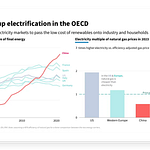Three news stories summarized & contextualized by analytic journalist Colin Wright.
US sues Adobe for ‘deceiving’ subscriptions that are too hard to cancel
Summary: Software company Adobe, which sells digital tools like Photoshop and Illustrator, has been sued by the US Justice Department for allegedly harming consumers by engaging in manipulative practices, like making it difficult and costly to end subscriptions, and enrolling customers in more expensive plans than they wanted.
Context: One of Adobe’s more overtly anti-consumer practices, according to the FTC, is a hefty cancellation fee that makes the company’s purported “monthly” plan anything but, charging folks for cancelling their memberships before a year has passed, but they’re also being accused of making the cancellation process unnecessarily arduous, and engaging in other sorts of manipulative behaviors meant to keep people paying, and paying more than anticipated; this is just one of many such lawsuits by US agencies against companies doing these sorts of things to consumers right now, and this one targets a pair of Adobe executives, as well—all of which is meant to serve as a warning to other companies doing similar things, alongside Adobe itself.
—The Verge
Russia overtook US as gas supplier to Europe in May
Summary: For the first time in nearly two years, Europe imported more gas from Russia than the US in May, partly due to temporary issues with a major US liquid natural gas (LNG) export facility, and a big surge in Russian gas exports through Turkey, leading up to a maintenance period this month.
Context: Following Russia’s invasion of Ukraine in February of 2022, it began to cut off gas flows to Europe, where many countries Russia hoped to convince not to get involved were heavily reliant on the fuel, and the US scrambled to build export capacity for its liquified gas product, which it could send via ship, but which would then need to be processed on the other end to make it usable across Europe’s grid; the upside of all this is that the US is now typically the biggest supplier of gas to Europe, Russia still provides gas to the bloc, but a lot less than before, and via a more circuitous route, and a five-year transit agreement between Russia and Ukraine, which makes the majority of those remaining shipments to Europe possible, via pipes running through Ukraine, ends this year, which—though Ukraine earns some money by allowing that gas to pass through its territory—seems unlikely to be re-upped, at this point.
—Financial Times
Three of Vietnam's five undersea internet cables are down
Summary: Late last week, three of the five undersea cables that serve internet connectivity to Vietnam failed, and they remain down as of mid-this-week; local internet service providers have not announced estimates as to when they think these cables will be back online.
Context: This is notable in part because, while sabotage is being seen as unlikely in this case, there have been a slew of what look to be seabed cable-cuttings in recent years, and it’s been speculated that China and Russia, separately, have been experimenting with these sorts of cuts using non-military vessels—though, again, that’s quite speculative right now, and there haven’t been any formal allegations on the matter; these cables, though increasingly vital to global communication, are also just really vulnerable to all sorts of degradation and damage from the passage of ships (especially their anchors), though, and some nations, due to the nature of their governance, the businesses tasked with managing the cables, and their local weather conditions, seabed setups, and so on, are also just a lot more likely to experience damaged cables, and notably, all five of Vietnam’s undersea internet cables went down last year, though the country remained connected to the internet via land-based connections, and it’s in the process of attempting to add 2-4 new undersea cables by 2025, which would almost double the country’s current maritime bandwidth.
—Reuters
The TSA reported the highest-ever number of passengers passing through US airport security on the Friday before Memorial Day this year (2.95 million) and Airlines for America have forecast that 271 million passengers will do the same this summer, between June 1 and August 31 (which would be an increase of 6% over the summer of 2023).
—Sherwood News
<5%
Percentage of air defense capabilities that have been determined necessary to defend Europe against a full-scale attack from Russia that NATO can currently muster.
Most of these defenses would be positioned in Central and Eastern Europe, and these sorts of defenses are considered to be increasingly vital in an era of warfare defined by heavy missile, rocket, and drone use.
—Financial Times












Share this post